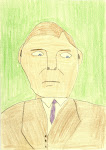I find myself thinking of all the many men, young and not so young, who devoted their lives to shaping this country. They all had full and comfortable lives before the Revolutionary War. But off they went to fight a fierce uneven fight, to lead a rag-tag army with no training, weapons, or line of supplies, to plead for money in countries an endless and unsafe ocean away so they could fight this righteous fight all the way through. And they fought not only with weapons but with words. The wrote. They wrote. They wrote.
How much of this country, its character and principles, is the product of words—the words of thoughtful men debating, revising, and finally writing down truths that were self-evident. The words came first—Thomas Jefferson's words in particular. The rest followed.
I sit in front of my computer, cup of coffee on a coaster nearby in case I need a pick-me-up, and google the Declaration of Independence. Except for the lovely bells and whistles of the opening
When in the Course of human events it becomes necessary for one people to dissolve the political bands which have connected them with another and to assume among the powers of the earth, the separate and equal station to which the Laws of Nature and of Nature's God entitle them, a decent respect to the opinions of mankind requires that they should declare the causes which impel them to the separation.
and the famous second sentence
We hold these truths to be self-evident, that all men are created equal, that they are endowed by their Creator with certain unalienable Rights, that among these are Life, Liberty and the pursuit of Happiness.
I have never read it. And as for those two sentences, they have become such a commonplace of the English language and of any political discourse that they have long lost, for me, or so I suddenly realize, any sense of the unabashedly radical.
What follows those two sentences is a legal brief that sets out the facts of the case for independence. Its clarity of word and thought, its sparse and tight presentation, its utter unaffected modernity, leaves me breathless. Here is a small sample:
For quartering large bodies of armed troops among us:
For protecting them, by a mock Trial from punishment for any Murders which they should commit on the Inhabitants of these States:
For cutting off our Trade with all parts of the world:
For imposing Taxes on us without our Consent:
For depriving us in many cases, of the benefit of Trial by Jury:
Frank Kafka said that writing should serve as the ax for the frozen sea within us. It can also impale a flagpole in the middle of your chest.
* * *
My father loves the English language. I had only a few months of English under my belt as a fourth or fifth-grader, when my father pulled out ragged copies of T.S. Eliot and Robert Frost and began to read out loud. We were sitting at the dinner table in Lima, Peru. His accent was strong, Germanic, even after the years in America. My brother Peter and I understood little back then of what he read during these repeated performances, other than that these words mattered to him, greatly.He said English was precise and muscular, that it put the verb right after the subject--in German it tends to get bumped to the complete final position in the sentence--and that made all the difference.
To my ear, back then, English was an ugly, rough cacophony of consonants. But not to my father. There he sat at our round dining room table, reading out loud, while my mother dished out dessert and then lit a cigarette. Inevitable, his voice would stumble, falter, and choke.
He had told us stories of the war, of the bombings and the hunger, of his father's death, of how, at age ten, he had walked alone across occupied Germany after D-Day to get home to Berlin, holding a teddy-bear and pushing a cart with his belongings, walking through ditches full of the dead--bloody and bloated. He told these stories and never wept. A few lines of The Love Song of J. Alfred Prufrock or The Road Not Taken and he would have to stop and, holding up his hand, steady the storm within.
But though I have wept and fasted, wept and prayed,
Though I have seen my head [grown slightly bald] brought in upon a platter,
I am no prophet--and here's no great matter;
I have seen the moment of my greatness flicker,
And I have seen the eternal Footman hold my coat, and snicker,
And in short, I was afraid.
( from The Love Song of J. Alfred Prufrock by T.S. Eliot)
* * *
I try to share my enthusiasm for the Declaration with Simon. But for all his thoughtfulness and although he just turned eleven, he is young. For him, courage and historical greatness are tied to swords and muskets, to military strategy, to hanging tough in the face of certain death. As it does not involve buckets of blood, writing doesn't count. Besides, written words have not yet touched his heart, defining who he is and will become, or what he might do with his life.
Moreover, being home-educated, he does not have to deal with teachers who restrict his freedom, prescribing what he can or cannot do. George and I do not get any points for being cool, but we are pretty accommodating. For now, Simon has little to rebel against, with either muskets or the English language.










































1 comment:
Beautifully put.
We were able to visit the Archives this week, and saw the Declaration of Independence and the Constitution.
Our boys, being so much younger than Simon, were simply impressed at the pages and pages of CURSIVE handwriting. :}
Post a Comment